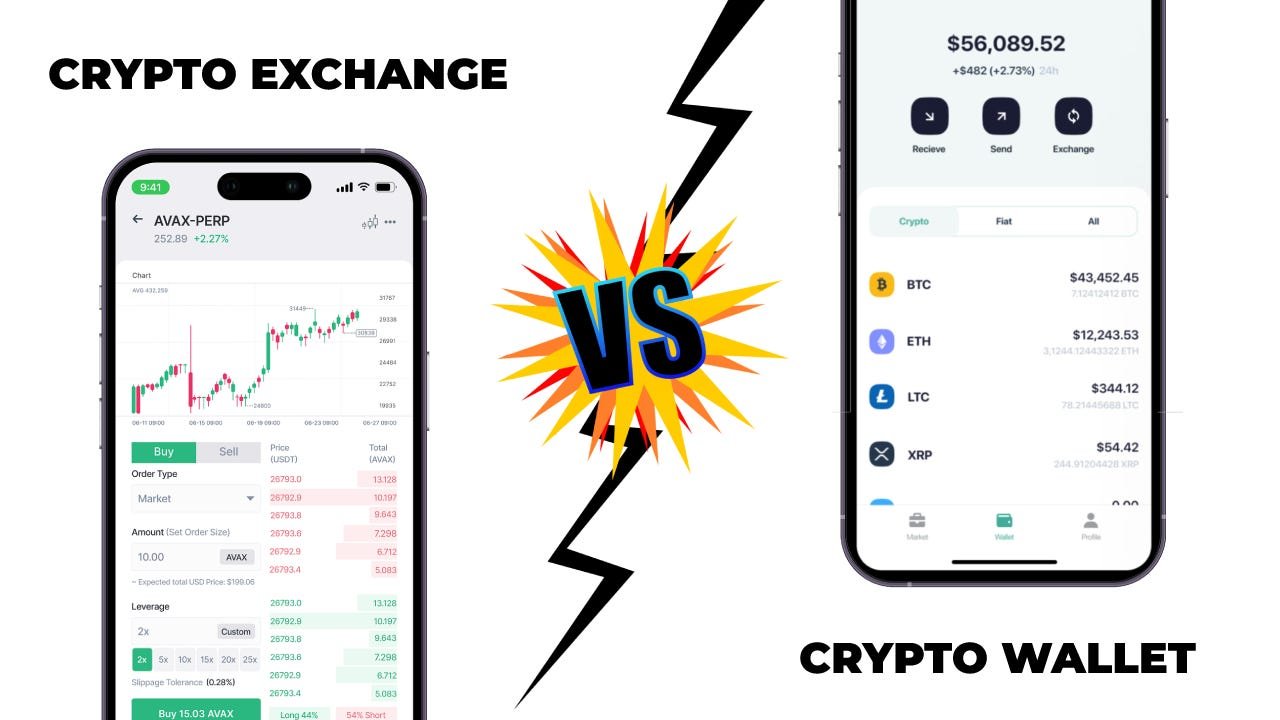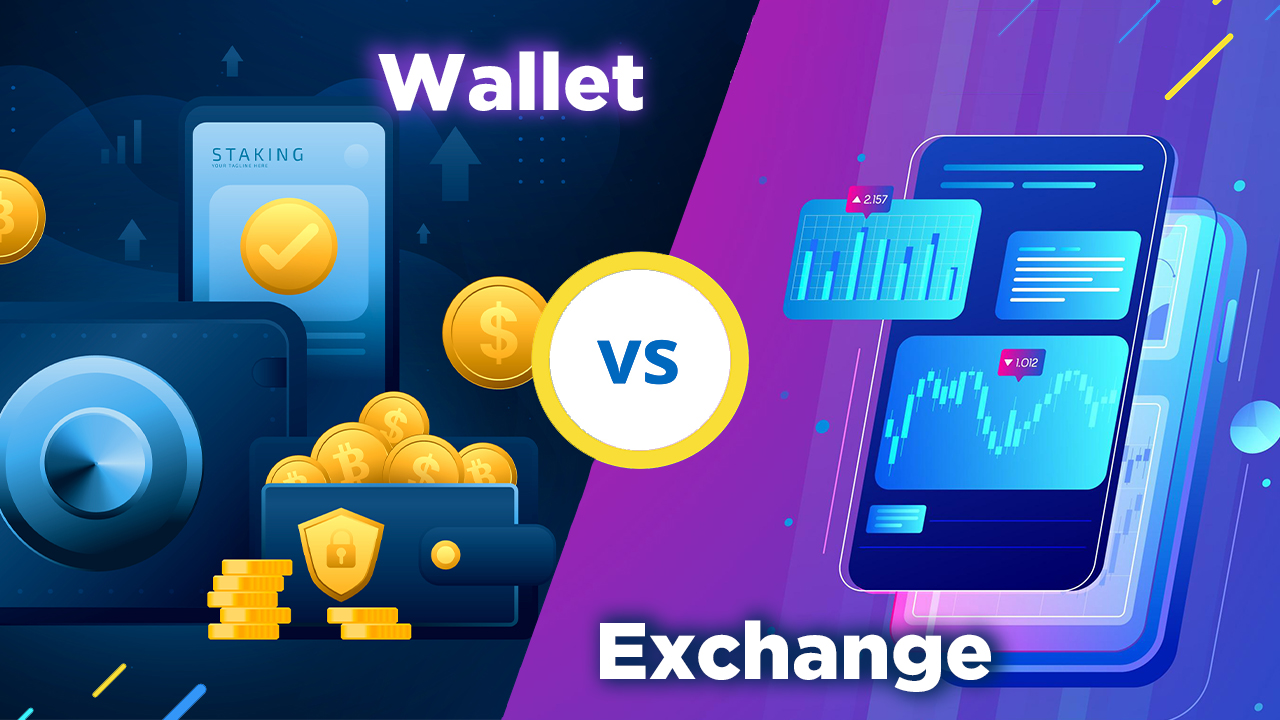
In digital forms of money, two essential gadgets accept specific yet interconnected parts: Crypto Exchange vs. Wallet. While both are significant for administering progressed assets, they fill different necessities and deal with various prerequisites. In this broad associate, we’ll examine the differentiations between crypto exchanges and crypto wallets, their remarkable components, and how they complete each other in the more excellent organic arrangement of computerized cash the leaders.
Understanding Crypto Exchanges:
A digital money trade is an internet-based platform intended to empower the buying, dealing, arranging, and exchanging of various advanced types of cash. These platforms act as go-betweens, interacting with buyers and shippers and providing a business place to exchange electronic assets. “Crypto exchanges offer diverse trading pairs for converting digital assets to USD or EUR.”
Key Features of Crypto Exchanges:
Market Orders: Crypto exchanges allow users to place market orders, where exchanges are executed at the ongoing business sector cost. Market orders offer fast execution yet may bring about slippage during high unpredictability.
Limit Orders: Users can also place limit orders, determining the cost they will trade a digital currency. Limit orders provide more control over the trade’s expense yet may allow for execution if the foreordained expense isn’t met.
Trading Pairs: Crypto exchanges offer an assortment of exchanging matches, permitting clients to trade one computerized cash for another. Ordinary trading matches integrate BTC/USD, ETH/BTC, and LTC/EUR, among others.
Liquidity: Liquidity alludes to the straightforwardness with which a resource can be traded on a trade without causing huge cost developments. Crypto trades with high liquidity offer better cost disclosure and quicker execution of exchanges.
Security Measures: “Top crypto exchanges use strong security measures, such as two-factor authentication, cold storage of assets, and encryption protocols, to protect client data.”
Regulatory Compliance: Many crypto exchanges operate under administrative systems and comply with Know Your Client (KYC) and Against Tax evasion (AML) guidelines to forestall unlawful exercises and guarantee the security of their foundation.
Understanding Crypto Wallets:
A cryptographic money wallet is a motorized instrument that allows clients to store, send, and receive mechanized financial structures safely. “Unlike traditional wallets, crypto wallets store electronic keys to manage blockchain assets securely.” “Crypto wallets include hardware, software, compact, and paper types, each providing different security levels and convenience.”

Key Features of Crypto Wallets:
Security: Crypto wallets prioritize security by encoding private keys and carrying out measures to forestall unapproved access and burglary of assets. Equipment wallets offer improved security by putting away confidential keys disconnected in a sealed gadget.
Access Control: Clients have full command over their crypto wallets and can access their assets whenever, anywhere, utilizing their confidential keys. This decentralized admittance guarantees that clients are not dependent on outsiders to manage their resources.
Transactional Capability: Crypto wallets permit clients to send and receive digital money to and from other wallet addresses. Exchanges are imparted to the blockchain network, where they are supported and recorded on the openly available report.
Compatibility: Crypto wallets support a wide range of cryptocurrencies and tokens, empowering clients to store and manage different resources inside a single wallet interface. Some wallets likewise support integrating with decentralized applications (DApps) and blockchain stages for improved usefulness.
Backup and Recovery: Many crypto wallets offer backup and recovery options, permitting clients to make encoded reinforcements of their wallet information or memory helper phrases (seed phrases). In case of misfortune or robbery, clients can utilize these reinforcements to reestablish admittance to their assets.
Client Experience: Crypto wallets endeavor to provide easy-to-use insight, with natural connection points and highlights intended to make overseeing computerized resources simple and open to clients of all degrees of involvement.
Differences Between Crypto Exchanges and Crypto Wallets:
While crypto trades and crypto wallets both assume fundamental parts in the digital money biological system, they vary in a few critical viewpoints:
Function: Crypto Exchange vs. Wallet fundamentally work with the purchasing, selling, and trading of computerized cash, probably as business communities for exchanging progressed assets. “Crypto wallets are used to securely store, send, and receive cryptographic cash, allowing control of assets.”
Custody: Crypto exchanges manage clients’ resources while they are successfully trading on the stage. Clients store their resources in exchange wallets, which the exchange manages. “Crypto wallets give users full control over their assets, managing independently without relying on third parties.”
Security: While driving crypto trades carries out strong safety efforts to safeguard clients’ assets, they are as yet defenseless against hacking assaults, insider dangers, and administrative dangers. “Crypto wallets enhance security by encrypting private keys and storing them safely, reducing theft risk.”
Accessibility: Crypto exchanges are available to clients who wish to exchange digital currencies, requiring account enlistment, personality checks, and financing of exchanging accounts. “Crypto wallets allow anyone to store and manage digital currencies without registration or verification requirements.”
Liquidity: Crypto trades offer liquidity by providing a commercial center for trading digital currencies. Clients can exchange with other market members at winning business sector costs. “Crypto wallets enable sending and receiving digital currencies on the blockchain.”
Regulatory Compliance: Many Crypto Exchanges vs. Wallets operate under administrative structures and comply with KYC and AML guidelines to forestall illegal activities and guarantee the security of their foundation. “Crypto wallets are mostly non-custodial, not requiring compliance with exchange regulations despite regulatory scrutiny in some areas.”

Conclusion
Crypto Exchange vs. Wallet is fundamental for overseeing advanced digital currency resources. “Exchanges handle buying and trading cryptocurrencies on centralized platforms, while wallets securely store and manage assets on the blockchain.” “”Grasping exchange and wallet differences, features, and functions is vital for crypto investors to protect assets.” “Using exchanges and wallets, clients can enhance crypto management and control digital assets securely and decentralized.”
Is Binance an exchange or wallet?
The Bottom Line. Binance is a digital currency exchange that runs down more than 350 cryptographic forms of money worldwide.
Why move crypto from exchange to wallet?
Storing cryptocurrency in an equipment wallet is an essential and exceptionally favored practice for obtaining computerized resources. With their disconnected stockpiling, equipment wallets give solid protection from digital dangers, unlike online wallets or trades that are powerless against hacking.








